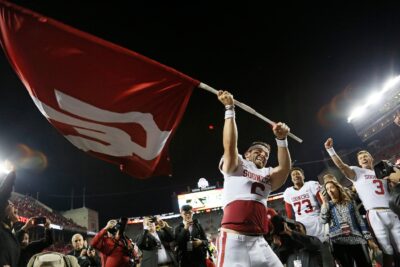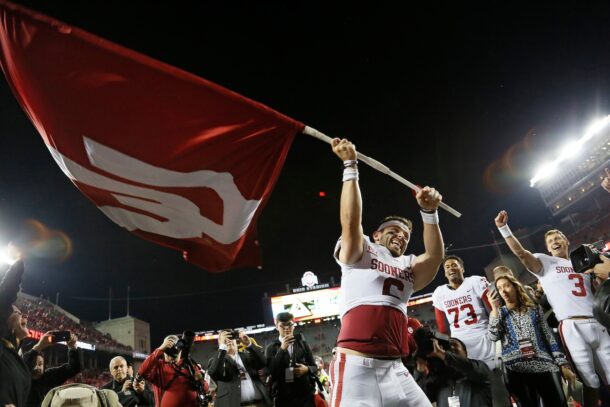Hypothetical chain reactions.
They fill the news hole this time of year and are extremely fun to talk about.
RELATED: What if Bear Bryant never left Kentucky?
If Peyton Manning hadn’t have nixed Archie’s alma-mater for Tennessee in 1994, how would both programs have looked at the turn of the century?
For starters, there’s a good chance the Vols would have two fewer SEC titles, wouldn’t have won the first-ever BCS national championship and Eli Manning may have been considered the league’s second-best quarterback in history behind Tim Tebow and ahead of his brother.
Believed by some to be the best quarterback in NFL history and arguably the SEC’s best pocket passer ever, Manning would’ve made Ole Miss relevant in the mid 1990s, continuing a family legacy started by his father in the late 1960s.
But it didn’t happen and the domino effect ensues.
The Tennessee Dominoes
1. Tennessee would’ve been short two SEC championships and the 1998 BCS title.
Over Peyton’s final three years in Knoxville, the Vols won 32 games including the 1997 SEC title. Manning departed from a team that brought back several impact players in 1998, including quarterback Tee Martin who studied under his predecessor’s tutelage for two seasons. Equipped with a vast knowledge of the offense and the bulk of Tennessee’s 1997 SEC champion team behind him, Martin led the Vols to their sixth national championship in 1998, finishing what Manning started.
2. A star may not have been born in David Cutcliffe.
While Manning watched his former teammates beat Florida State in the Fiesta Bowl for the crystal football as the Colts’ franchise rookie quarterback, Rebels fans had to find satisfaction in an 8-win season and up-and-coming first-year head coach David Cutcliffe who had just been hired on Dec. 2, 1998 to replace Tommy Tuberville.
Cutcliffe was Peyton’s offensive coordinator at Tennessee. (Who knows where one of college football’s current most underrated coaches — now at Duke — would be without his early success alongside No. 18) Thanks to his family ties, Cutcliffe would land Eli two months later as the crown jewel of his 1999 Ole Miss signing class, but the damage was done. Peyton had just set five NFL rookie records in Indianapolis while Tennessee was the nation’s top college football team coming off a national title.
At Duke, Cutcliffe’s been a true college coaching Houdini. He inherited a lackluster program in 2008 that had posted just three winning seasons over the previous 25 years. Cutcliffe’s done it twice and even won the ACC’s Coastal Division (unthinkable for Blue Devils football) in 2013. He has transformed Duke from doormat to formidable foe in the conference and is well-respected as one of college football’s best among his peers.
3. Phillip Fulmer’s legacy wouldn’t be as strong as it is today.
Following Tennessee’s 13-0 season in 1998 that Manning helped cultivate, Fulmer posted double-digit wins four times over his final 10 seasons after hitting the magic number three times in four years during Peyton’s tenure. Not counting the BCS title, the Vols won as many bowl games during that span as they did with Manning in charge (3). Peyton essentially helped Fulmer build his reputation during his early years as a head coach after being a longtime assistant in Knoxville and paved the way for a lengthy tenure. Without signing the kid out of New Orleans, would Fulmer be a member of the College Football Hall of Fame? Probably not.
4. Reggie White would be considered the face of Tennessee football.
Manning and White are synonymous with greatness and are always mentioned as the Vols’ best player of the modern era. One of the NFL’s all-time greatest pass rushers, the ‘Minister of Defense’ as they call him, White would likely stand on his own as Tennessee’s most recognizable player in program history had it not been for Peyton’s dominance at a high-profile position after him. White’s 32 career sacks remains a school record.
At Tennessee, Peyton holds nearly every career and single-season passing record and won several national awards. While their NFL careers are comparable, Manning’s college numbers overshadow White’s up-and-down career in Knoxville.
The Ole Miss Dominoes
5. Ole Miss would’ve become a more attractive landing spot for recruits thanks to national exposure with a prominent quarterback.
During Manning’s elite career at Tennessee, Ole Miss went just 23-22, getting over the .500 mark with a Motor City Bowl win in 1997. Not only would the Rebels have won more games had Manning switched divisions, but increased national relevancy would’ve likely led to better players in the coming years as a result of being a perennial Top 25 team in the televised spotlight.
6. Rebels’ chances to win a national championship during Eli’s tenure would’ve been strengthened thanks to said recruiting influence.
Peyton may not have brought Ole Miss a national championship, but he would’ve made the Rebels a contender in the Western Division and laid the foundation for greater success when his brother came aboard as the nation’s top prep quarterback while he was a rookie in the NFL.
Eli Manning’s much-anticipated 1999 arrival in Oxford was a cause for celebration considering his brother’s disappointing decision five years prior, but it could’ve marked the ultimate multi-generation trifecta had Peyton followed suit previously. Instead, Eli left his mark with several program records as a three-year starter but failed to developed Ole Miss into a national title contender like his Tennessee comrade, who was surrounded by considerably better talent.
7. Tommy Tuberville’s arrival at Ole Miss would’ve come at a later date.
Ill-fated coach Joe Lee Dunn, who lasted just one season at Ole Miss in 1994, may have kept his job another year if Peyton had signed and was the instantaneous threat many thought he would be as a true freshman. Dunn’s departure gave way to future Auburn coach Tuberville who lasted four years and posted a mediocre record 25-20 over that span. Later at Auburn, Tuberville went 85-40 over a decade’s time at the program and finished unbeaten during 2004 season.







